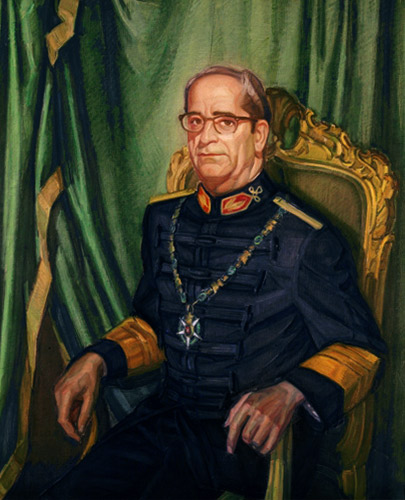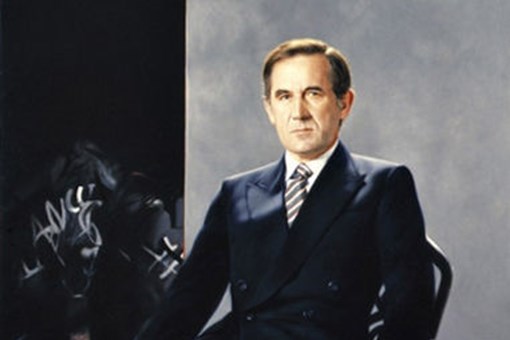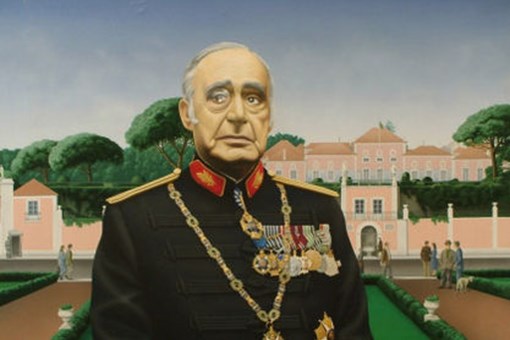Francisco da Costa Gomes
Born in Chaves on 30 June 1914, died on 31 July 2001.
Son of António José Gomes and Idalina Júlia Moreira da Costa. His parents were of farmers’ stock with an average income. The father, an army captain, died when his son was only 7 years old.
He married Estela da Costa Gomes in 1952. They had one son.
ACADEMIC CAREER
Attended the Military School (Colégio Militar) from 1925 to 1931.
Graduated with distinction in Mathematics, Oporto University, 1944.
POSITIONS HELD PRIOR TO THE PRESIDENCY OF THE REPUBLIC
In 1931 he enlisted in the cavalry. He was placed in the 9th Cavalry Regiment and promoted to second-lieutenant in 1935. Seconded to the Guarda Nacional Republicana (National Republican Guard). Between 1945 and 1946 seconded to the General Headquarters of the Supreme Allied Command Atlantic in Norfolk, Virginia, United States, becoming an expert on NATO matters. He participated in various conferences at the organisation.
He was then successively Deputy-Chief and Chief of Staff of the province of Macao from 1949 to 1951, and witnessed the unfolding of the war in Korea. In 1952, he taught at São João de Deus School, accumulating this with his military duties.
He was under-secretary of state for the Army in 1958, and played a part in the April 1961 military plot with General Botelho Moniz, then Defence Minister, and as a result was removed from office.
It was as under-secretary of state that he sent the first military observation mission to Algeria with the aim of preparing Portuguese troops in future to cope with subversive warfare.
He created the Lamego Gunners Company to prepare anti-guerrilla troops, an attitude decided after his visit in 1958 to Angola, Guinea, Cape Verde and São Tomé e Príncipe. Having been relieved of his duties in 1961 he was removed and sent to Beja barracks.
He taught the Curso de Altos Comandos at Instituto de Altos Estudos Militares between 1962 and 1965 with the rank of brigadier.
He was 2nd commander of the Mozambique Military Region from 1965 for a period of four years.
In 1970 he was commander of Angola Military Region where he remodelled the chief command and promoted the idea of a military understanding with UNITA (União para a Independência Total de Angola – Union for Total Independence of Angola). This understanding was broken in 1972 for reasons not attributable to his command. He was appointed to be Chief of Defence Staff on 12 September 1972, replacing General Venâncio Deslandes.
He was dismissed in March 1974, just before the 25 April revolution, for refusing to swear the oath of loyalty to Marcelo Caetano’s government.
He was one of seven soldiers who made up the Junta de Salvação Nacional (National Salvation Board) in April 1974, following the coup d’etat that overthrew the New State regime.
From 25 April to 30 September 1974 he was Armed Forces Chief of staff with the prerogatives of Prime Minister.
He became President of the Republic on the indication of the Junta of National Salvation, following General Spínola’s resignation on 30 September 1974.
He occupied this position until 27 June 1976, when General Ramalho Eanes won the elections.
MAIN WORKS PUBLISHED
On Portugal: Diálogo com Alexandre Manuel, Lisbon, Regra do Jogo, 1979.
Visages de Corée, Lisbon, s.e., 1981.
Ecosocialismo, Uma Alternativa Verde para a Europa, with Carlos Antunes and Isabel do Carmo, Lisbon, Divergência, cop. 1990.
When speaking of this individual we are not merely talking of the man who was President of the Republic at an important moment of the consolidation of the April 74 revolution, but of the personality as a whole. What he did and what he does.
Men should not only be considered for what they were or represented at a given moment in history.
Costa Gomes had an exemplary record sheet in the military forces. His military training was technically-inclined. He maintained contacts abroad giving him the perception of technological innovation and a realistic notion of international politics.
Called by Botelho Moniz, then Defence Minister, to take part in the government, he was charged with reorganizing the Armed Forces where he was able to apply the experience he had acquired. Below is an excerpt from an interview he gave to Diário de Lisboa in July 1976:
"In 1958, precisely on 4 April 1958, a law came out concerning the military reorganisation of the overseas territories given the help they could give mainland Portugal in a conventional war… this reorganization did not even envisage the possibility of a subversive war and was so far removed from the African reality that it did not even consider the possibility that we might soon be confronted with a war ".
In the end, this reorganization was not put into practice. However, it gives us an idea of the profile of this realistic and practical person.
Costa Gomes always demonstrated firmness in defending the ideas in which he believed. Examples include his public defence of a political solution to the war in Africa, in April 1961 and his refusal to compromise with the generals in March 1974, although these decisions had negative consequences on his personal and professional life. Appointed to assume the Presidency of the Republic after António de Spínola’s resignation in September 1974, he shouldered the mission of conducting the country to its first free, democratic elections. Although his path was beset by difficulties his mission was successful.
He could have stopped here. He had amply shown his worth and his merit. He always refused to be a politician and said he was a soldier.
Following his departure from the Presidency of the Republic he worked in the World Peace Council where he was vice-president, and president of the Portuguese Committee.
His attitudes, although within the military field or related thereto, were always political.



